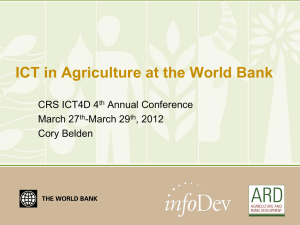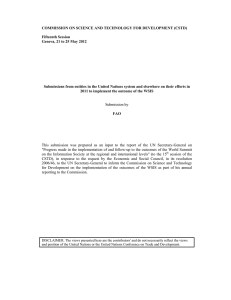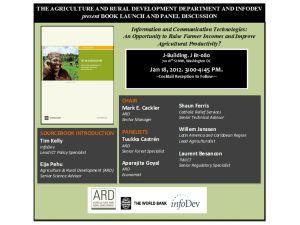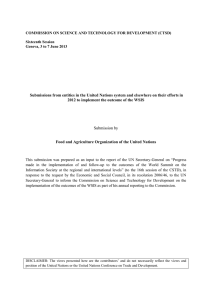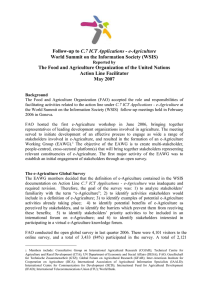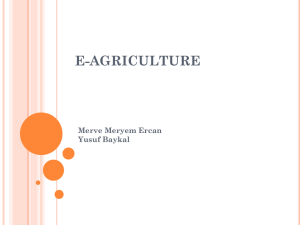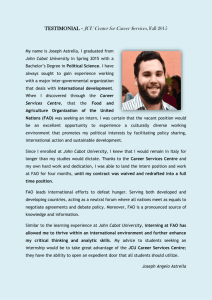COMMISSION ON SCIENCE AND TECHNOLOGY FOR DEVELOPMENT (CSTD) Fourteenth Session
advertisement
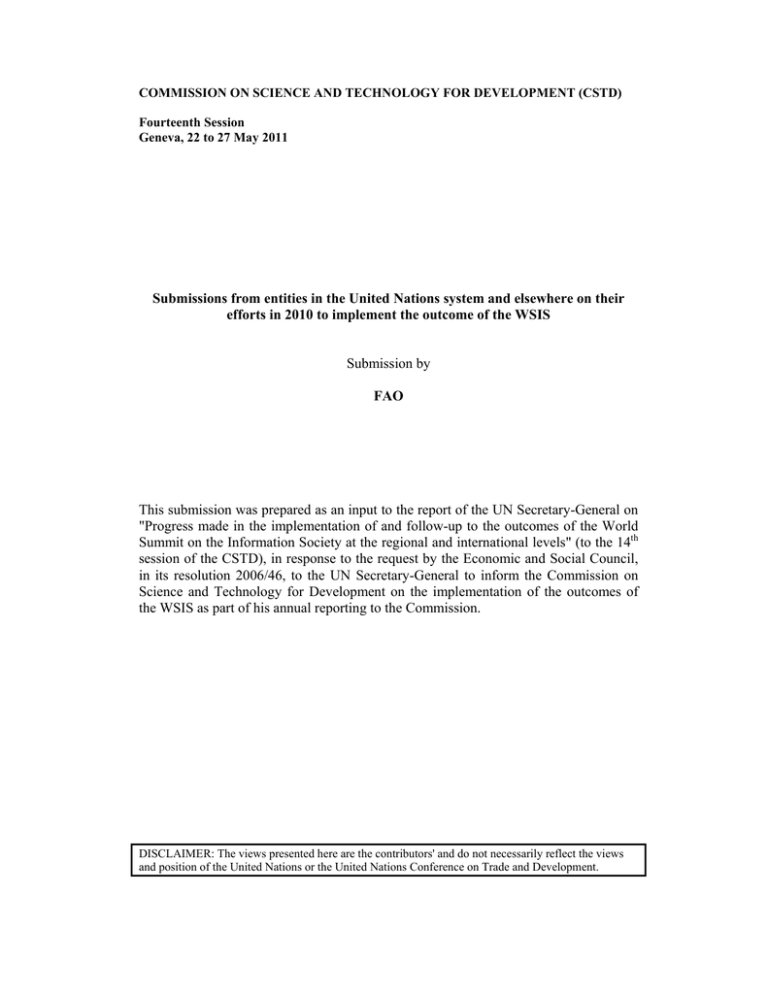
COMMISSION ON SCIENCE AND TECHNOLOGY FOR DEVELOPMENT (CSTD) Fourteenth Session Geneva, 22 to 27 May 2011 Submissions from entities in the United Nations system and elsewhere on their efforts in 2010 to implement the outcome of the WSIS Submission by FAO This submission was prepared as an input to the report of the UN Secretary-General on "Progress made in the implementation of and follow-up to the outcomes of the World Summit on the Information Society at the regional and international levels" (to the 14th session of the CSTD), in response to the request by the Economic and Social Council, in its resolution 2006/46, to the UN Secretary-General to inform the Commission on Science and Technology for Development on the implementation of the outcomes of the WSIS as part of his annual reporting to the Commission. DISCLAIMER: The views presented here are the contributors' and do not necessarily reflect the views and position of the United Nations or the United Nations Conference on Trade and Development. SUBMISSIONS FROM FAO: EFFORTS IN 2010 TO IMPLEMENT THE OUTCOME OF WSIS ACTION LINE, E-AGRICULTURE Presented by Anton Mangstl, Director, Office of Knowledge Exchange, Research and Extension, FAO Michael Riggs, Knowledge and Information Management Officer, FAO and e-Agriculture Lead Facilitator 6 December 2010 EXECUTIVE SUMMARY At WSIS, the Food and Agriculture Organization of the United Nations (FAO) accepted the responsibility of organizing activities related to the Action Line (C.7) on ICT Applications with specific reference to “e-Agriculture”. In 2006 the multi-stakeholder e-Agriculture Working Group (EWAG1) was set up to guide efforts in this area. In September 2007, the e-Agriculture Community of Practice (the Community) was officially launched as a global initiative to enhance sustainable agricultural development and food security by enhancing the use of ICT in the sector. The overall aim of the Community is to enable members to exchange knowledge related to e-agriculture, and to ensure that the knowledge created is effectively shared and used worldwide. By the end of 2010, the e-Agriculture community has added about 1,000 new members growning to over 7,000 registered individuals. This membership encompasses development practitioners, policymakers, representatives of farmer organizations, researchers, and information and communication specialists involved in agriculture and rural development, from more than 150 countries. The Community activities comprise three components: a web-based multilingual2 space for knowledge sharing and collaboration on a neutral domain (www.eagriculture.org); face-to-face events; and in-country interventions. Over this past year, e-Agriculture Community members from around the world participated in activities such as online forum discussions (virtual meetings), international and regional meetings, and free online capacity building opportunities (through the IMARK3 partnership). Participation from both the private sector and non-UN organizations was secured with subject matter experts volunteering their time from the AgLR-Task Force, APC, GenARDIS, IICA, IICD, IFAD, UNCTAD and other organizations. Though restrained by limited staff and financial resources, the e-Agriculture Community has again remained strong over the past years due to the active commitment of volunteers and community members. However, looking to realize the Community’s full potential, FAO 1 Original members included: the Consultative Group on International Agricultural Research (CGIAR); Technical Centre for Agriculture and Rural Development (CTA); UN Department of Economic and Social Affairs (DESA); FAO; Gesellschaft fur Technische Zusammenarbeit (GTZ); Global Forum on Agricultural Research (GFAR); Inter-American Institute for Cooperation on Agriculture (IICA); International Association of Agricultural Information Specialists (IAALD); International Centre for Communication for Development (IICD); International Fund for Agricultural Development (IFAD); International Telecommunications Union (ITU); and the World Bank. Since then, more members have joined and contributed, including participation from Microsoft, IBM, Swisscontact Katalyst, Grameenphone Ltd, and others. 2 The Platform is available in English, French and Spanish. 3 See http://www.imarkgroup.org for information. continues to search for both financial support to the Community and substantive editorial contributions for the multilingual platform (particularly in regards to French). It is envisioned that the e-Agriculture Community will grow in 2011 by building upon the current successful knowledge sharing functions with a totally new web platform with improved opportunities for online interaction, and developing an interconnected series of case studies, models of action and means for assessment based on inputs from the e-Agriculture Community. Lessons learned from national and regional components will more readily be captured and disseminated through the e-Agriculture Community, and through other major participating institutions in support of capacity building. TRENDS AND EXPERIENCES IN IMPLEMENTATION AT THE NATIONAL, REGIONAL AND INTERNATIONAL LEVEL The e-Agriculture Community of Practice is a global initiative launched by FAO in partnership with the e-Agriculture Working Group (now known as the “Founding Partners” to reflect the evolving partnership) to enhance the role of ICT in agricultural development and food security. It provides an international framework to facilitate the processes of capturing, managing, and disseminating the lessons learned through national and regional activities, as well as the results and implications of multilateral processes related to the use of ICT in agriculture and rural development. The e-Agriculture Community also provides the basis for the international community to monitor development and validation of conceptual models and methodologies, and to package and disseminate them once tested. Through its collective activities some additional outputs of the Community include: the development and strengthening of innovative mechanisms and processes for information exchange and communication, including normative guidelines and tools being formulated, tested and disseminated to address the range of demands and capabilities of different Community members; empowering networks for exchange of new mechanisms and processes among key stakeholders; relevant content in digital format being developed, filtered, mobilized and exchanged by community members; and other activities based on active partnerships and collaborative lesson-learning. The success of the e-Agriculture Community depends to a great extent on the active engagement of a wide range of stakeholders, all with a common interest. FAO4 currently serves as the Secretary and Facilitator for the community, coordinating activities and programmes based on commutation and collaboration with the Community at large. FAO also coordinates and facilitates the development, content creation/packaging, and maintenance of the web-based platform, as well as coordinating face-to-face events and drafting of policy documents. It also experiments with new social media tools to extend and improve the reach of e-Agriculture to stakeholders. Regular bulletins of the e-Agriculture Community’s outputs are provided to both Community members and to relevant global bodies, including the WSIS Secretariat, the Global Alliance for ICT and Development (GAID), and the United Nations Group on the Information Society (UNGIS). The web-based collaboration component of the Community’s activities is the most popular and effective tool to engage with its members. In 2010 memberships grew to more than 7,000 individuals. The platform relies solely on volunteer efforts to lead discussions and assist in providing content, which contributes towards the development of policies and best practices. For this the Community is grateful to the individuals and organizations that have willingly taken on leading roles in the Community’s activities. Additional details highlighting some of these activities can be found below. 4 The e-Agriculture Community of Practice benefits from FAO’s experience on its successful implementation of the Bridging the Rural Digital Divide Programme and its related web-based platform (see http://www.fao.org/rdd). The e-Agriculture Community of Practice, however, continues to face financial limitations that constrain possibilities for further expansion, and thereby limit the potential of this dynamic Community. As there are no funds solely dedicated to the e-Agriculture Community, there are limited resources to support its in-country activities and multi-lingual development. This is particularly relevant with regards to expanding its multi-lingual engagement to reach French and Spanish speaking community members more effectively. However, through increased collaboration with the Instituto Interamericano de Cooperación para la Agricultura (IICA) and other partners in Latin America in 2010 there has been a notable improvement in Spanish content. The continued success of e-Agriculture will depend on the active involvement of a wide range of stakeholders and in-kind contributions from organizations in the development community and the private sector. To ensure its future and expand its positive impact, it is envisioned that a formal secretariat should be established, with the primary goal of supporting country-level interventions and other related knowledge sharing activities at the global level. INNOVATIVE POLICIES, PROGRAMMES AND PROJECTS The Community is active online, at face-to-face events, and through the activities of members working in-country. Key topics identified by the Community become the focus of virtual discussions, face-to-face events, information collections, and policy briefs. The interplay between different formats and mediums is important. FAO facilitated a full schedule of virtual and face-to-face activities in 2010. Some of the most successful are described below. Face-to-Face Activities (Conferences, Meetings and Workshops): February 2010: In a unique collaborative effort including FAO, IICD, CTA, APC, UPOU, Gamos, IAALD, and other members of the e-Agriculture Community, work is progressing on a conceptual framework to enhance the impact of ICTs in rural development. This innovative work strives to build upon the many existing models and frameworks, expanding our understanding of the impact ICTs have in rural development, and how this understanding can improve the design and positive impact of ICTs interventions. The collective work has gone through an early vetting at the IAALD World Congress, and will be more widely shared soon through multiple channels. May 2010: World Summit on the Information Society Global Forum 2010, in Geneva, Switzerland. Session on ICT and Rural Enterprises. This interactive session combined the eagriculture and e-business action lines, and was organized by FAO, UNCTAD and ITC. Interactive debate among panelists and the audience. The debate was moderated by Allison Hornery, Cofounder, CivicTEC, with panellists H.E. Iruthisham Adam, Permanent Representative, Permanent Mission of the Republic of Maldives to the United Nations Office at Geneva; Caroline Figuères, Managing Director, IICD; Roxanna Samii, Manager Web, Knowledge and Internal Communications, International Fund for Agriculture Development (IFAD); Md Shahid Uddin Akbar, CEO, Bangladesh Institute of ICT in Development; Peter A. Bruck, Chairman, World Summit Award; and, Carlos Afonso, Director, Brazil's Information Network for the Third Sector (RITS) and founder of the Association for Progressive Communications. August 2010: eIndia Conference, in Hyderabad, India. This conference brought together ICT experts, practitioners, business leaders and stakeholders of the region onto one platform, through keynote addresses, paper presentations, thematic workshops and exhibitions. Within the conference was a special focus on e-agriculture, designed to initiate inter-sectoral linkages; facilitate progressive decision-making, information sharing and performance improvement; bring policy makers, development professionals, researchers, academicians, community stakeholders, corporate on a discussion dais; and aid the process of identification and integration of diverse ICT tools that are employed in present day agricultural practices. A feature presentation at e-Agriculture 2010 was on eAgriculture Policy: perspective to practice, presented by Michael Riggs, e-Agriculture Lead Facilitator. December 2010: ICT2010, in Egham, United Kingdom. The largest event in 2010 focused on the use of information and communication technologies for development ICTD 2010 features a special session on e-Agriculture perspectives: enhancing the impact of ICT in rural development. Experts and thought leaders from the e-Agriculture Community engaged with the audience to discuss how ICT can enable rural economic development, leading to poverty reduction and sustainable rural livelihoods. It also considered the key role of partnerships, and how the different stakeholders can contribute to these ends. Presenters and panellists included Scarlett Fondeur Gil, ICT Analysis Section, UNCTAD; Shahroz Jalil, Director, Katalyst Bangladesh; Sonia Jorge, Research Director, Pyramid Research; Harsha Lineage, Managing Director, Sarvodaya-Fusion; Pierre Lucante, Head of GTZ Sector Project ICT4D; Sapna Narula, Assistant Professor, Faculty of Policy and Planning, TERI University; Oumy Ndiaye, Head of Communication Services, CTA; and, Stijn van der Krogt, Director Country Programmes, IICD. Virtual Activities (Online Forums and Social Media) During this year, virtual forums with the collective participation of thousands of individuals from around the world have focused on: July 2010: Gender, ICTs and Rural Livelihoods (English) with GenARDIS and APC Women. Jul-Aug 2010: The Role of ICTs in Agricultural Value Chains (Spanish) with IICA. October 2010: Learning Repositories in Agriculture Food & Environment (English) with the AgLR-Task Force. November 2010: ICT for Rural Economic Development (English) with GTZ/BMZ. More information on these virtual events, including the discussion forums, resource materials and summary reports can be found at http://www.e-agriculture.org/forums-archive. In 2010, the Community expanded its social media activity. A Twitter account was established, which now has over 1,700 followers, further expanding the Community's objectives of improving the use of ICTs for rural development through knowledge sharing across a diverse network of development stakeholders. In addition presences were established on Facebook and LinkedIn, to reach out to young people and professionals, respectively. To develop capacity, throughout 2010 Community members were invited to participate in the expanding free e-learning resources available, which are providing capacity building and professional development opportunities for ICT practitioners in developing countries. The Information Management Resource Kit (IMARK) (http://www.imarkgroup.org/) curriculum now offers seven modules in several languages. The Community features information on each new module as they arrive. Publications Collective action of the Community in collaboration with the Centre for Science, Development and Media Studies (CSDMS) produced a special issue of i4d magazine devoted to eAgriculture in April 2010. The issue with ten unique articles is available at http://www.i4donline.net/jan-march-2010/index.asp. FUTURE ACTIONS/INITIATIVES TO BE TAKEN Frameworks for Development and Evaluation There is a growing body of knowledge, draft frameworks and other supporting materials in the field of digital ICT programme development and monitoring and evaluation (M&E).5 To continue advancing this important body of work, FAO, the International Institute for Communication and Development (IICD), and others will build upon the expert consultation held in 2010 to further refine frameworks that will guide planning and implementing development investments that exploit ICT, as well as monitoring and evaluating their impacts on rural livelihoods. Possible Involvement in In-Country Interventions and Sub-communities The e-Agriculture Community of Practice will focus on expanding its mechanisms for knowledge sharing around learning lessons through in-country interventions. These lessons will be drawn from the activities of e-Agriculture Community members, encompassing national and regional level interventions on information exchange and communication, from which successful elements will be expanded and scaled up. The mechanisms will foster the capturing and sharing of lessons through the e-Agriculture Community web platform, and through other major participating institutions in support of capacity development. There is always the potential that as the Community continues to grow in size, there will be a need to recognize focused interest groups (sub-communities). This would be a natural part of the growth cycle of any community of practice. The actual timing and results of such events are however, difficult to predict. The Challenge of Financial Support As for FAO’s contribution to the Action Line on e-agriculture, and to the Community’s facilitation and platform, the Organization will continue to provide content support, in the form of materials; subject matter experts to act as editors and moderators; and other activities, tapping into staff from across the organization including various divisions and offices in FAO headquarters and the decentralized offices. These contributions will be supplemented through outsourced contracts, depending on the size of the initiative and the external resources available. The strategy for mobilizing resources for activities under this initiative has two elements, namely (a) provision of resources by the stakeholders themselves, from both core and project funding, and (b) mobilization of funds from multilateral and bilateral sources to finance the development of the Community’s activities. Contributions from the second source are essential in this stage of expanding development of the e-Agriculture Community. Currently no steady funding source is provided by any institution, apart from the continued staffing contributions offered by FAO and forum support provided ad-hoc by partner organizations through subject matter expert participation. Expansion of Activities Through Support for a Formal Secretariat In order to foresee the continuing expansion of the e-Agriculture Community of Practice, and especially in regards to supporting country interventions, the establishment of a formal Secretariat is envisioned. 5 ODI/FAO/DFID (2001/3), ODI/InfoDev (2006/7), Various/Gates (2007), IICD (2007) Hosted by FAO, the Secretariat would be responsible for the following: 1) to develop, prepare and implement various multilingual communication plans and advocacy related to eagriculture, its Working Group and to the e-Agriculture Community; 2) to arrange for and service virtual and face-to-face meetings for e-Agriculture Community discussions as agreed by the Community members; 3) to coordinate, prepare, share, and disseminate resources (relevant news, reports, case studies, etc.) and to monitor/analyze outcomes of member activities by a broad field of local, national and regional stakeholders; 4) to serve as editorial manager of the Community’s web-based platform, including design and implementation; 5) to coordinate technical (IT) and administrative arrangements for the Community; 6) to coordinate and support in-country activities, based on the needs of the Country Community leaders; 7) and to report to the relevant global bodies and institutions.
